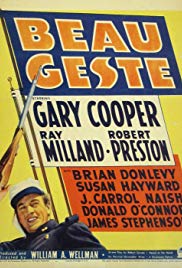BEAU GESTE
SUBJECTS — World/France;
SOCIAL-EMOTIONAL LEARNING — Leadership; Families in Crisis; Brothers;
MORAL-ETHICAL EMPHASIS — Trustworthiness.
AGE: 12+; No MPAA Rating;
Drama; 1939, 114 minutes; B & W.
There is NO AI content on this website. All content on TeachWithMovies.org has been written by human beings.

SUBJECTS — World/France;
SOCIAL-EMOTIONAL LEARNING — Leadership; Families in Crisis; Brothers;
MORAL-ETHICAL EMPHASIS — Trustworthiness.
AGE: 12+; No MPAA Rating;
Drama; 1939, 114 minutes; B & W.
Three orphaned brothers from an upper-class English family suddenly join the French Foreign Legion, usually the refuge of men with a past that they want to forget. What is their dark secret? Does it have anything to do with the large sapphire that was the bulk of their family’s fortune?
MODERATE: Smoking and alcohol use and abuse are shown. The first scene, one of the most striking in all of film, shows a deserted fortress in the middle of the desert manned by dead soldiers propped against the battlements so that they appear to be standing and pointing their rifles outward. The corpses give the eerie impression that the fort is defended. This scene stays with people all of their lives and may be upsetting to sensitive children.
France, like England, had an extensive colonial empire. Examples of countries that were French colonies are: Algeria, Lebanon, Vietnam, French Guyana, and several Caribbean islands. The French Foreign Legion was formed to help the French army conquer and control the colonies. The Foreign Legion took any man without regard to his past, gave him a fictitious name, and permitted him to start a new life. Thus, its soldiers were often outlaws, outcasts or political refugees. The French Foreign Legion was renowned for its fighting ability.
The telegraph was the first practical method of sending information electronically. It came into common use in the second half of the 19th century and has only recently been replaced by facsimile, teletype, and next day delivery services. Even after the telephone became ubiquitous, messages that were important were sent by telegraph.
England had a difficult transition from Roman Catholicism to Protestantism. Oliver Cromwell, who ruled England from 1653 to 1658, was active in suppressing Catholicism. The room where the Blue Water was hidden had been the secret refuge of a priest during the time of Cromwell’s persecution of Catholics.
During the time of this movie in the late 19th century, 30,000 pounds was a fortune.
“Beau geste” is French for beautiful gesture or deed. It may not be immediately apparent, but what happened in this movie was that Beau, while he was concealed in the armor, saw his aunt sell the real Blue Water sapphire to the man in the turban to obtain money for the family to live on. It was replaced by a fake. When Sir Hector demanded that the Blue Water be sold to pay his gambling debts, Beau knew that his aunt would be disgraced. He, therefore, stole the imitation and admitted to stealing the real gem in order to protect his aunt. This was the “beau geste.” The only place in which he could have adventure and anonymity was the French Foreign Legion.
This family had a problem. It was solved in a certain way that had important consequences for the lives of the three brothers. What was the problem? Can you think of a better way for this family to have solved its problem?
Suggested Response:
The problem was the grandfather’s gambling addiction that prevented him from giving the family enough money for its support. It was solved with deception, i.e., the Blue Water was secretly sold for the money necessary to live in the style in which the family was accustomed. The ramifications were that the boys went into the Foreign Legion, sacrificing their chance for a normal life. The actions of all are an example of the family facilitating the Grandfather’s addiction. For a description of co-dependence see Learning Guide to “Anne B. Real”.
1. See Discussion Questions for Use With any Film that is a Work of Fiction.
2. How were the colonial powers, with relatively small armies, able to control large territories and populations in their colonial empires?
Suggested Response:
This is a complex question, and there are many ways to answer it. A start at an answer is that the colonial powers were able to dominate large territories and populations with small numbers of troops through the technological superiority of their arms and the advanced organization in their military combined with diplomatic tactics such as “divide and rule.”
3. Is it a good idea to have a division of an army in which any class of people, even criminals, can join?
Suggested Response:
Only if very stringent discipline is maintained and any criminal tendencies in the troops are rigidly controlled.
1. Who are the real villains in this story? The uncle who is addicted to gambling? A society which is rigid in its expectations? Markoff? Boys whose heads are filled with romantic ideas about adventure and war? Some or all of the above?
2. What was the “beau geste?”
See also Quick Discussion Question above.
3. In what way did Markoff “lead” his men? Do you agree with this style of leadership?
Discussion Questions Relating to Ethical Issues will facilitate the use of this film to teach ethical principles and critical viewing. Additional questions are set out below.
(Be honest; Don’t deceive, cheat or steal; Be reliable — do what you say you’ll do; Have the courage to do the right thing; Build a good reputation; Be loyal — stand by your family, friends, and country)
1. Did Beau do the right thing in stealing the copy of the gem to protect his aunt from disgrace? What about the aunt, what should she have done?
French Foreign Legion, telegraph, telegram.
Last updated December 9, 2009.